


Songs That Made History: There are songs which have been directly connected with incidents in the history of the United States; most noteworthy of these is The Star-spangled Banner.
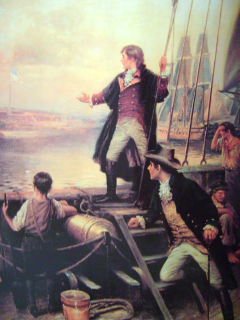
Though this has never been officially adopted as the national anthem, it is used as such by the army and the navy. The words go back to the time of Napoleon, when England found herself at war in many parts of the world, including the United States. In the summer of 1814 there was a British squadron, under the command of Vice-Admiral Sir Alexander Forester Inglis Cochrane, in Chesapeake Bay, attacking the city of Baltimore. On 13th September, a young lawyer of the city, Francis Scott Key, rowed out with a companion to a British ship, to plead for the release of a prisoner, a medical friend of his. The two arrived at in inopportune moment, just as the ships were going into action. So they were obliged to remain on board all day and night, while the ships were bombarding Fort McHenry, the main defence of the city. At nightfall the issue was uncertain; early next morning the two Americans went on deck to strain their eyes in the half-light, eager to see if the flag was still flying over the fort or whether it had been hauled down; at last, as it grew lighter, they saw it--the Stars and Stripes. Then, born of the emotion of the moment, there flashed into Key's mind the now familiar lines:
Oh, say, can you see, by the dawn's early light, What so proudly we hailed at the twilight's last gleaming? Whose broad stripes and bright stars, through the perilous fight, O'er the ramparts we watched, were so gallantly streaming? And the rockets' red glare, the bombs bursting in air, Gave proof through the night that the flag was still there. Oh, say, does the star-spangled banner still wave O'er the land of the free and the home of the brave?
It is said he wrote this verse down, then and there, on the back of an envelope; the other verses were added later.
By a curious irony, these verses have always been sung to an English tune, known as the Anacreontic Song. During the late eighteenth and early nineteenth centuries there were many clubs in London and other large towns. Some of these were political, but many were merely convivial; the members would meet at regular intervals to eat, drink, talk, and smoke. At such meetings there was generally some 'harmony,' that is, singing of songs, catches, and glees. One such club was the Anacreontics. They met at the Cross and Anchor tavern in the Strand; they had their own special song with which they opened or closed the proceedings. This was called the Anacreontic Song and the words ran as follows
To Anacreon, in Heaven, where he sat in full glee,
A few songs of Harmony sent a petition
That he their inspirer and patron would be.
When their answer arrived from the jolly old Grecian,
'Voice, fiddle, and flute
No longer be mute,
I'll lend you my name and inspire ye to boot,
And besides, I'll instruct you, like me, to entwine
The myrtle of Venus with Bacchus's vine.'
The tune of this song was composed by John Stafford Smith. It became popular in this country, and must have crossed the Atlantic. The words of The Star-spangled Banner fit the tune like a glove: it seems certain that the author of the verses must have cast them in this unusual metre, because he had the tune in his head. But it is likely that he did not realize till later that the tune was of British origin, and was that of a drinking song. It is strange that Key wrote his words on board an English ship to commemorate the success of the Americans who held out against its bombardement, and that his verses were then sung to an English tune.
It is a bold, well-constructed tune with a striking first phrase, formed liek the parts to so many other fine tunes, from the notes of the common chord. Puccini has made very effective use of this first phrase as a leitmotif in his opera Madama Butterfly.
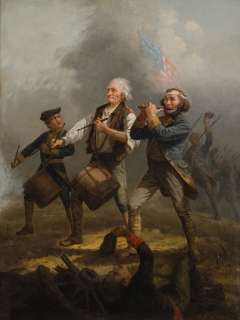
Yankee Doodle has, for some obscure reasons, become a national tune of America. It can hardly be called a national song, since the words are such nonsense. The tune is said to be of Dutch origin. It was known in England in the times of Charles II as Lydia Fisher's Jig, and it was sung to the words:
Lucy Locket lost her pocket, Kitty Fisher found it; Nothing in it, nothing on it, But the binding round it.
These words are still to be found in books of nursery rhymes. The most likely origin of the words of Yankee Doodle is that they were written at Albany in 1758. This is the year before Wolfe defeated Montcalm at the Heights of Abraham. At Albany there was a British force under Lord Amherst opposed to a mixed force of French and Indians. The local, North American recruits were thought to be a very raw, ungainly lot. So an English doctor, by name Richard Shuckburgh, who was attached to the staff, concocted some rather silly verses which he adapted to the nursery-rhyme tune. These are the original Yankee Doodle verses.
There is some doubt as to the origin of the word 'Yankee.' One supposition is that it is a corruption of the word 'English' as pronounced by Indians; another, that it is a corruption of the Dutch 'Jankes,' applied by them to the inhabitants of New York. The term was applied by the British indiscriminately to the whole population. During the Civil War it was applied by the Southerners to the Northerners. The dictionary says of 'doodle' that it means a silly or foolish fellow--much the same as 'noodle.' 'Hasty pudding' is flour stirred into boiling milk and the mixture stirred quickly.
Attempts have been made to fit the tune with more sensible words, but none of them have been very successful. As an offset to the uncomplimentary chorus of the original, there is the following:
Yankee Doodle is a tune That comes in mighty handy The enemy all run away At Yankee Doodle Dandy.
But it is strange that the tune can have become a national symbol without attaching to itself some more worthy words.
John Brown's Body is one of the most famous of all marching songs. The historic John Brown was a most enthusiastic adherent of the policy of abolition of slavery in the 1850's, when this was a burning issue in the States. He took the law into his own hands by an attack on the village of Harper's Ferry in Virginia, in order to free the slaves in the neighbourhood. But the expected rising of slaves did not take place. After some bloodshed on both sides, John Brown was captured by the authorities, tried, and executed. He was a man of burning zeal and the highest motives, but his action was ill-conceived and amounted to insurrection. After his death, the growing policy of slave-abolition in the Northern States caused him to be regarded as a hero, indeed, almost as a martyred saint. The song probably originated in a revivalist hymn, sung at camp meetings in the South--in fact, what we call nowadays a spiritual.
The words sing to ot bgean: 'Say, brothers, will you meet us on Canaan's happy shore?' The chorus of this, 'Glory, glory, Hallelujah,' survives in its later form. There is a story that the song was brought north by a couple of soldiers, and that some rhymes were made up to fit it, about a certain Scotsman, John Brown, who was serving with the Northern Army. This John Brown became identified with the historic John Brown and the words were modified to fit his history. There is no form of the words that can be called authentic. Jeff Davis, referred to in verse 5, is Jefferson Davis, President of the Confederate States. He was captured by the Northern army in 1865, after the collapse of his government.

John Brown's Body became the great marching-song of the Northern armies. It was sung by the army of General Sherman in its famous march to the sea in the autumn of 1864. Sherman cut himself off from his base and communications, turned his back on the enemy, and marched from Atlanta to the sea at Savannah. There is another song about that exploit, Marching through Georgia, but this did not become popular till later. It is to be found in most song-books:
Hurrah, hurrah, we'll bring the Jubilee, Hurrah, hurrah, the flag that makes you free, So we sang the chorus from Atlanta to the sea, When we were marching through Georgia.
Attempts have been made to provide the tune of John Brown with more worthy verses. The most distinguished of these is Julia Ward Howe's fine set knwon as the battle-hymn of the republic: Mine eyes have seen the glory of the coming of the Lord. These are in some song-books and in recent hymn-books. In this country they are often sung to a modern tune by Martin Shaw.
The Southern Armies had their marching song, I wish I was in Dixie. This was first sung at a minstrel show in New York in 1859, before the Civil War. It was the composition of a negro singer and song-composer, Daniel Decatur Emmett. The words reflect the nostalgia of the Southerner away from his home in the streets of the northern city. There are two theories about the origin of the name 'Dixie' as applied to the southern states; one, that it is derived from the term 'Mason and Dixon's line' which defined the boundary between the free and the slave states; the other, that it originated in the slang term for the money issued by a bank in New Orleans before the Civil War. On the back of the ten-dollar bills was printed the word 'Dix,' together with other lettering in French. Hence the Southern States, particularly Louisiana, became known as the land of Dixies, i.e. Dixie Land.
The strange thing about all this is that, when the two armies marched against one another, that of the North sang a song to a tune which had started life in the South, that of the South sang a song which had originated in the North.
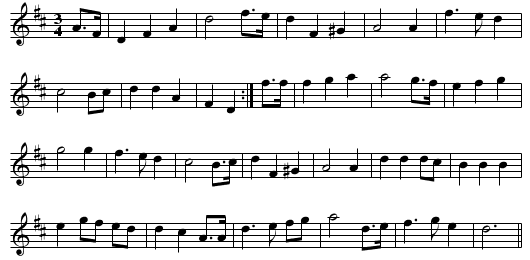
|
Oh, say, can you see, by the dawn's early light, What so proudly we hailed at the twilight's last gleaming? Whose broad stripes and bright stars, through the perilous fight, O'er the ramparts we watched, were so gallantly streaming? And the rockets' red glare, the bombs bursting in air, Gave proof through the night that the flag was still there. Oh, say, does the star-spangled banner still wave O'er the land of the free and the home of the brave? On the shore, dimly seen through the mists of the deep, Where the foe's haughty host in dread silence repose, What is that which the breeze, o'er the towering steep, As it fitfully blows, half conceals, half discloses? Now it catches the gleam of the morning's first beam, In full glory reflected, now shines in the stream; 'Tis the star-spangled banner; oh, long may it wave O'er the land of the free, and the home of the brave. Oh! thus be it ever when freemen shall stand Between their loved homes and the war's desolation, Blest with victory and peace, may the heaven-rescued land Praise the Power that hath made and preserved us a nation. Then conquer we must, when our cause it is just, And this be our motto: 'In God is our trust!' And the star-spangled banner in triumph shall wave O'er the land of the free and the home of the brave! |

|
Father and I went down to camp,
Along with Captain Gooding;
And there we saw the men and boys,
As thick as hasty pudding.
Yankee Doodle, keep it up,
Yankee Doodle Dandy;
Mind the music and the step,
And with the girls be handy.
And there we see a thousand men,
As rich as Squire David;
And what they wasted every day,
I wish it could be saved.
And there was Cap'n Washington,
And gentlefolks about him;
They say he's grown so 'tarnal proud
He will not ride without 'em.
I saw another shoal of men,
A-digging graves they told me;
So 'tarnal long, so 'tarnal deep,
They 'tended they should hold me.
It scared me, so I hooked it off,
Nor stopped, as I remember,
Nor turned about till I got home,
Locked up in mother's chamber.
|
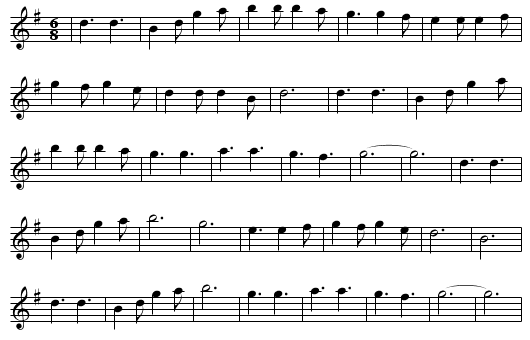
|
John Brown's body lies a-mould'ring in the grave
John Brown's body lies a-mould'ring in the grave
John Brown's body lies a-mould'ring in the grave
But his soul goes marching on.
Glory, glory, Hallelujah!
Glory, glory, Hallelujah!
Glory, glory, Hallelujah!
His soul goes marching on.
He's gone to be a soldier in the army of the Lord!
His soul goes marching on.
John Brown's knapsack is number ninety-three,
As he goes marching on.
His pet lambs will meet him on the way,
And they'll go marching on.
We'll hang Jeff Davis on a sour apple tree,
As we go marching on.
|
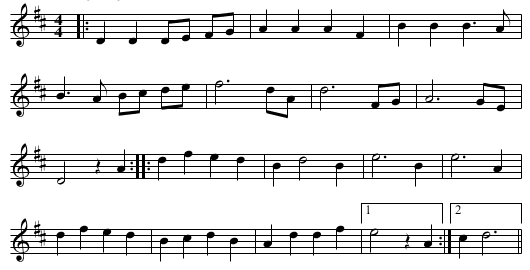
I wish I was in de land ob cotton,
Old times dar am not forgotten;
Look away! Look away! Look away! Dixie Land!
In Dixie Land whar' I was born in,
Early on one frosty mornin',
Look away! Look away! Look away! Dixie Land!
Den I wish I was in Dixie,
Hooray! Hooray!
In Dixie Land I'll take my stand,
To live and die in Dixie;
Away, Away,
Away down south in Dixie.
|
Old Missus marry Will, de Weaber, Willium was a gay deceaber; Look away! Look away! Look away! Dixie Land! But when he put his arm around'er, He smiled as fierce as a forty-pounder, Look away! Look away! Look away! Dixie Land! His face was sharp as a butchers cleaber, But dat did not seem to greab 'er: Look away! Look away! Look away! Dixie Land! Old Missus acted the foolish part, And died for a man dat broke her heart, Look away! Look away! Look away! Dixie Land! Now here's a health to the next old Missus, And all the gals dat want to kiss us; Look away! Look away! Look away! Dixie Land! But if you want to drive 'way sorrow, Come an hear dis song to-morrow. Look away! Look away! Look away! Dixie Land! |
Excerpt taken from: H.E. Piggott, Songs That Made History. J.M. Dent & Sons Ltd, London, 1937.
Photo Credits:
(1) Edward Percy Moran (1912): Francis Scott Key standing on boat with right arm stretched out toward the United States flag flying over Fort McHenry,
(2) Archibald M. Willard (1876): Yankee Doodle or The Spirit of '76,
(3) Afro-American Slaves Dancing (c.1780)
(unknown/website);
(4) 'The Star-Spangled Banner',
(5) 'Yankee Doodle',
(6) 'John Brown's Body',
(7) 'Dixie',
(by ABC Notations).